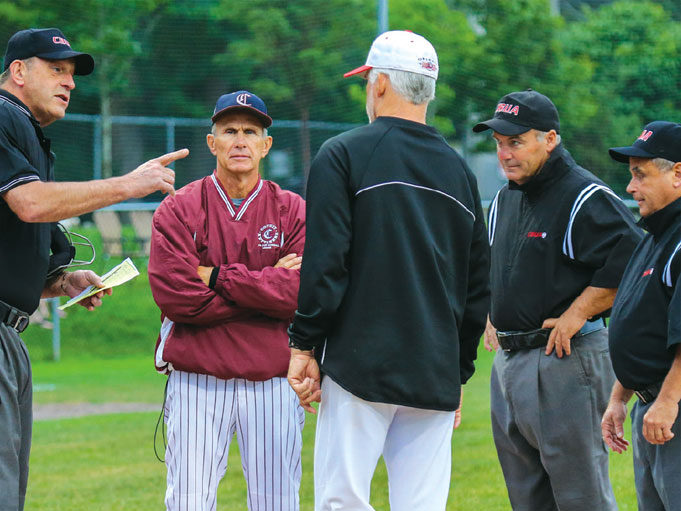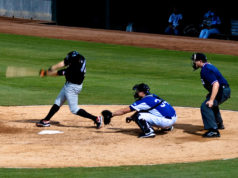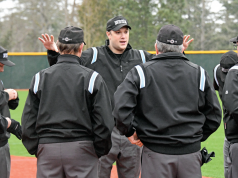It’s always useful to review a few perception issues that can get umpires off on the wrong foot at the start of a contest or create negative feelings as the game progresses. None of the following eight items fit in the category of rocket science, and all have been covered at one time or another, but it’s good to put them together in a nice, neat package.
1. Don’t arrive at the ballpark looking like you just came out of the gutter.
Put away the flip-flops, cut-offs and tank tops, and instead wear a pair of slacks and a sport shirt. Don’t have three or four day’s worth of whisker growth. If you look like a slob when you arrive at the park, people are more likely to think you’re umpiring like a slob as the game progresses. When you arrive, give the home team a “hi” sign that you’re there. No need for extended conversations and visits. A quick acknowledgment of your presence will do. Some coaches won’t care, but others will because, for example, their starting pitcher routinely begins warming up X minutes before the contest starts and it throws a monkey wrench in things if the umpires are unexpectedly late. If they know you’re on site, the coaches can comfortably proceed with their pregame routine.
2. Even if you’re used to working with your crewmate(s), have a good pregame meeting.
You don’t necessarily have to follow everything in your usual script (and it’s good to have a script), but you should at least hit the high spots like basic coverage and rotations. It’s also a good idea to discuss how individual members and the crew as a whole are going to handle ejections if they occur and how to communicate to each other that you have useful information to provide if an unusual situation arises and is one that the applicable mechanics book allows umpires to get help on.
3. Be conscious of the impression you’re likely to create when you walk to home plate to start the game.
Especially if one or both teams don’t know who some or all of you are, they are likely to at least subconsciously form a positive or negative impression based on your body language and demeanor when you first appear on the field. If the impression is negative, it will almost inevitably affect whether they give you the benefit of the doubt on close pitches and plays.
A longtime assistant coach at the University of Texas, who had also had some years in minor league baseball, once told me that he absolutely believed that he could tell if a guy could umpire just by the way he walked up to the plate.
Don’t walk to the plate rigidly, like you’re a four-star general surveying the troops, but at the same time don’t slouch. Try to be as neutral and professional as you can. When you get to the plate, don’t throw your mask on the ground to free up your hands to deal with lineup cards. Keep it tucked under your upper arm.
4. If the ground rules need to be covered, ask the home team manager to do that.
“How about taking us around the field, coach?” And unless he announces some unique twist that clearly violates the rulebook, go along with the ground rules he lays out and don’t try to change them. It’s his ballpark, not yours. The exception is if you think player safety is an issue or that something just doesn’t make sense, in which case you can tactfully ask if the coach has considered an alternative.
5. Don’t be overly friendly with the home team coaches and players when you enter the field, even if you’ve worked many games for that team and know everyone on a first-name basis.
The visitors will be watching, and if they don’t know who you are, you could feed paranoia. Don’t call one coach by his first name at home plate and the other one “coach.” Keep it consistent. During the game, don’t be overly talkative with the players. A few words here and there are fine, but don’t make it a yuk-it-up party.
6. Pay attention to what the base coaches are saying with runners on base, especially if you’re working a two-umpire crew.
They’ll let you know when, for example, the shortstop is creeping in behind a runner, so you’ll be better prepared if a pickoff attempt happens.
7. Don’t get together with your partner(s) every half inning.
It makes things look like you’re not taking the game seriously, especially if you’re joking around. As an observer, I can’t tell you how many times I’ve watched two base umpires seemingly having a party and then glanced over to see a coach looking at them with a grimace. If you really need to discuss something, fine, but keep it serious.
8. Don’t just walk everywhere; instead, use a little trot, or at least a brisk walk.
When we lope along like we’re bored to death — and sometimes we are — we give players and coaches an easy target if a close play happens. I can just hear it now: “Move around out there! You’re killing the grass!”
If we’re not conscious of the impressions we are creating, we can create negative impressions that affect assessments of our work. In an ideal world we’ll be given the benefit of the doubt and judged entirely on balls and strikes, safes and outs, how we manage the game and the like.
But that’s not the real world. Problems we create for ourselves can undermine all the good work we do during the game.
What's Your Call? Leave a Comment:
Note: This article is archival in nature. Rules, interpretations, mechanics, philosophies and other information may or may not be correct for the current year.
This article is the copyright of ©Referee Enterprises, Inc., and may not be republished in whole or in part online, in print or in any capacity without expressed written permission from Referee. The article is made available for educational use by individuals.


















